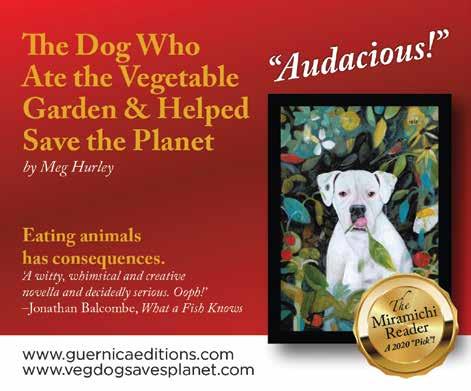
4 minute read
Plant-Based Dogs Meg Hurley
PLANT-BASED DOGS
Meg Hurley For the past 15 years, the Boxers and the mixed-breed rescue who lived and do live with us have eaten only plants— no meat, fish, eggs, and no dairy. In 2005, when we started feeding the dogs organic plant-based meals, exclusively, this was uncharted territory, mostly, but we were determined to figure it out for three reasons, one being that Boxers have high cancer rates.
Advertisement
Eating an organic whole-foods, plantbased diet ourselves, we knew that nutritional scientists (who are biochemists) have proven that humans eating whole-foods, plant-based (WFPB) diets can prevent, stop, reverse, and even cure several deadly and debilitating diseases, including many cancers, heart disease, diabetes, ED, osteoporosis, obesity, arthritis, and psoriasis. Much of their research is done with animals, such as turning off cancer cell production with plant foods. So we wondered whether WFPB meals for dogs could minimize—even prevent—cancer so prevalent in many breeds and other issues like skin problems.
Before we began their new diets I read everything I could find about WFPB diets for dogs. Also, I called Dr. T. Colin Campbell, Cornell University’s Jacob Gould Sherman Professor Emeritus of Nutritional Biochemistry, founder of the T. Colin Campbell Center for Nutrition Studies, and author of The China Study, a New York Times bestseller on how eating animal protein makes humans sick, contrary to popular beliefs. Dr. Campbell trained in veterinary medicine before earning his Ph.D. in biochemistry/nutritional science. Although he knew of no research to support the health benefits of plantbased meals for dogs, he said it made sense. Our supportive veterinarian joined us on the sharp learning curve.
Since then the dogs have thrived as vegan dogs. All of them have been and continue to be healthy and vigorous and live beyond Boxers’ 8 to 10-year lifespan. They eat cooked vegetables, a mix of grains, a mix of beans, and fruits, excluding those that are not safe, such as grapes, avocadoes, and some nuts. We add in small amounts of organic vegan kibble, nutritional yeast, ground flax and sunflower seeds, and Vegedog for a full complement of vitamins and minerals. They eat with gusto! Yes, they have had cancer, but tumors were very small and the lowest grade. Healing has been quick and without complications.
Today, there are more and more veterinarians who are supportive of plant-based diets for canines and willingly undertake the necessary Winter 2021


education. That said, I stress that the fresh plant foods fed dogs should be either cooked or pureed because dogs do not have the enzymes for breaking down plant cell walls. Also, the pesticides and insecticides used on crops cause several deadly and debilitating diseases, so it is important to feed them organic food. I have not found any veterinary clinics that sell plant-based foods, but there is an abundance of vegan dog kibbles and wet foods available online and in pet stores, but most are not organic. We buy an organic kibble from Minnesota that is made fresh every three weeks, does not sit in warehouses, and is shipped directly to us from the manufacturer.
At the beginning of this article, I said that there are three reasons why we feed the dogs an organic WFPB diet, their health being foremost. The second has to do with the fact that raising animals for food is the leading driver of global warming and environmental destruction. In 2010, the United Nations issued a report calling on the world to transition to plant-based diets as the only way to stop Global Warming and to end hunger and starvation. Our third reason is compassion for animals. Since no health needs exist to eat animals—plants have more than adequate protein—then there are no needs to breed and to kill them; animals want to live full lives free from harm just as you and I do.
All this may sound far-fetched, so I encourage you to watch Netflix documentaries such as: Cowspiracy, What the Health, Forks Over Knives, and Game Changers. We can end the suffering— ours, the animals’ and the planets’ by eating WFPB diets and feeding dogs the same. If you want to read a quirky and witty book on the subject, then my new novella The Dog Who Ate the Vegetable Garden & Helped Save the Planet (Guernica World Editions 2019) might appeal to you; it’s narrated by a charming and opinionated vegan dog—a real dog. The book’s a quick read, and won a Canadian literary award for “exceptional internationally published books.” The book’s website is vegdogsavesplanet.com and there you will also discover more about how we feed the dogs a WFPB diet. You can email me through the site with your questions and concerns. I hope you and “your” dogs join the “kind diet” movement, too, for the sake of all life on the planet! Winter 2021














